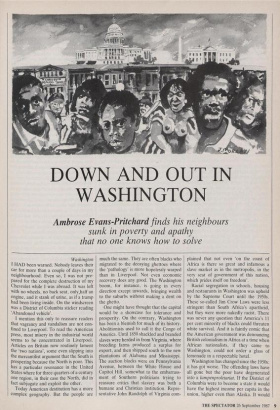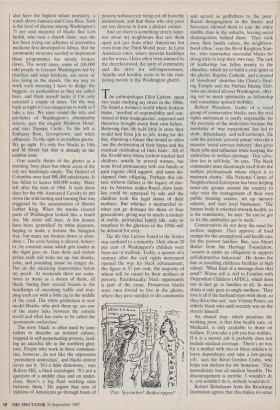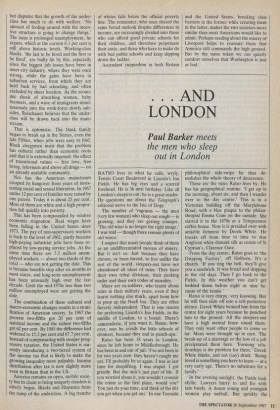DOWN AND OUT IN WASHINGTON
Ambrose Evans-Pritchard finds his neighbours
sunk in poverty and apathy that no one knows how to solve
Washington I HAD been warned. Nobody leaves their car for more than a couple of days in my neighbourhood. Even so, I was not pre- pared for the complete destruction of my Chevrolet while I was abroad. It was left with no wheels, no back seat, only.half an engine, and it stank of urine, as if a tramp had been living inside. On the windscreen was a District of Columbia sticker reading `Abandoned vehicle'.
I mention this only to reassure readers that vagrancy and vandalism are not con- fined to Liverpool. To read the American press, most misery in the industrial world seems to be concentrated in Liverpool. Articles on Britain now routinely lament the 'two nations', some even slipping into the mercantilist argument that the South is prospering because the North is poor. This has a particular resonance in the United States where for three quarters of a century one region, in their case the North, did in fact subjugate and exploit the other.
Today American destitution has a more complex geography. But the people are much the same. They are often blacks who migrated to the decaying ghettoes where the 'pathology' is more hopelessly warped than in Liverpool. Not even economic recovery does any good. The Washington boom, for instance, is going in every direction except inwards, bringing wealth to the suburbs without making a dent on the ghetto.
One might have thought that the capital would be a showcase for tolerance and prosperity. On the contrary, Washington has been a blemish for much of its history. Abolitionists used to call it the Congo of America. Until 1850 shackled and branded slaves were herded in from Virginia, where breeding farms produced a surplus for export, and then shipped south to the new plantations of Alabama and Mississippi. The auction blocks were on Pennsylvania Avenue, between the White House and Capitol Hill, somewhat to the embarrass- ment of Southern politicians trying to reassure critics that slavery was both a humane and Christian institution. Repre- sentative John Randolph of Virginia corn-
plained that not even 'on the coast of Africa is there so great and infamous a slave market as in the metropolis, in the very seat of government of this nation, which prides itself on freedom'.
Racial segregation in schools, housing and restaurants in Washington was upheld by the Supreme Court until the 1950s, These so-called Jim Crow Laws were less stringent than South Africa's apartheid, but they were more nakedly racist. There was never any question that America's 11 per cent minority of blacks could threaten white survival. And it is faintly comic that the American government was denouncing British colonialism in Africa at a time when African nationalists, if they came to Washington, could not order a glass of lemonade in a respectable hotel.
Washington has changed since the 1950s: it has got worse. The offending laws have all gone but the poor have degenerated into a luntpenproletariat. If the District of Columbia were to become a state it would have the highest income per capita in the union, higher even than Alaska. It would
also have the highest infant mortality, a touch above Jamaica and Costa Rica. Such is the level of disease among Washington's 71 per cent majority of blacks that Lois Smith, who runs a church clinic, says she has been trying out schemes of preventive medicine first developed in Africa. But the community structure needed to implement these programmes has mostly broken down. The worst cases, some of 100,000 odd people in Greater Washington fed by charities and soup kitchens, are more or less living in the streets. On my way to work each morning I have to dodge the beggars, or panhandlers as they are called here, and think myself lucky if I'm only accosted a couple of times. On the way back at night it's too dangerous to walk so I take a taxi. We steer round the ruts and pot-holes of Washington's abominable streets, past the elegant Madison Hotel, and into Thomas Circle. To the left is Embassy Row, Georgetown, and white affluence. To the right is an endless ghetto. We go right. It's only five blocks to 10th and M Street but that is already in the combat zone.
One usually thinks of the ghetto as a teeming, busy place but whole areas of the city are hauntingly empty. The District of Columbia once had 900,000 inhabitants. It has fallen to nearer 600,000 today. Many left after the riots of 1968. It took three days for the 6th Armoured Cavalry to put down the wild looting and burning that was triggered by the assassination of Martin Luther King. When the smoke cleared parts of Washington looked like a bomb site. My street still does. A few houses have been 'gentrified' by white pioneers, hoping to make a fortune the Islington way, but many are broken down or aban- done-1. The eerie feeling is allayed, howev- er, by constant noise which gets louder as the night goes on. Gun shots and violent police raids still wake me up, but drunks, yobs, and pounding music no longer do.
Nor do the shrieking transvestites below my porch. At weekends there are some- times as many as a dozen of them, all black, baring their steroid breasts in the headlamps of oncoming traffic and stop- ping each car with a little jig in the middle of the road. The white gentlemen in new model Buicks, who pick them up, are one of the many links between the outside world and what has come to be called the `permanent underclass'.
The term `black' is often used by jour- nalists to describe an isolated culture, trapped in self-perpetuating poverty, lead- ing an anarchic life in the northern ghet- toes. People who work in these communi- ties, however, do not like the expression 'permanent underclass', and blacks almost never use it. 'It's a false dichotomy,' says Robert Hill, a black sociologist. It's not a question of a middle class and an under- class, there's a big fluid working class between them.' He argues that tens of millions of Americans go through bouts of poverty without ever being cut off from the mainstream, and that those who stay poor are too diverse to form a distinct culture.
And yet there is something utterly hope- less about my neighbours that sets them apart not just from other Americans but even from the Third-World poor. In Latin American cities, where material hardships are far worse, I have often been stunned by the cheerful mood, the spirit of community and the drive for self-improvement. Apathy and hostility seem to be the com- peting moods in the Washington ghetto.
The anthropologist Elliot Liebow spent two years studying my street in the 1960s. He found a woman's world where feckless males, `terrified of responsibility and con- vinced of their inadequacies', expected and therefore brought about their own failure. Believing that life held little in store they would hop from job to job, living for the day, shunning a future that would so often `see the destruction of their hopes and the eventual realisation of their fears'. All of the 30-odd men whom Liebow tracked had children, usually by several women, but none lived permanently with one family or paid regular child support, and some dis- claimed their offspring. Perhaps this cul- ture without fathers is the legacy of slav- ery. In America, unlike Brazil, slave fami- lies could be separated by sale and the children took the legal status of their mothers. But whether a matriarchal in- stinct can go dormant for three or four generations, giving way to nearly a century of stable, patriarchal family life, only to resurface in the ghettoes in the 1950s will be debated for ever.
The life that Liebow found in the Sixties was confined to a minority. Only about 20 per cent of Washington's children were born out of wedlock. Today, a quarter of a century after the civil rights movement opened the way for black advancement, the figure is 57 per cent, the majority of whom will be raised by their mothers in poverty. Paradoxically, black opportunity is part of the cause. Prosperous blacks were once forced to live in the ghetto, where they gave stability to the community Tsst. Spycatcher? Bodice-ripper?' and served as godfathers to the poor. Racial desegregation in the Sixties and Seventies allowed them to join the white middle class in the suburbs, leaving social disintegration behind them. `They took away their family values, the neighbour- hood ethos,' says the Revd Knighton Stan- ley, who reproaches successful blacks for doing little to help their own race. The task of leadership has fallen mainly to the churches, which try to build a civic spirit in the ghetto. Baptist, Catholic, and a myriad of 'storefront' churches like Christ's Heal- ing Temple and the Nubian Islamic Heb- rews are dotted all over Washington, offer- ing not so much spirituality as fellowship and sometimes upward mobility.
Robert Woodson, leader of a vocal group of conservative blacks, says the civil rights movement is partly responsible for the paralysis of the underclass because the mentality of `war reparations' bas led to sloth, dependency, and self-contempt. He calls the activists `poverty pimps' who run a massive `social services industry' that gives them jobs and influence while keeping the underclass in welfare peonage. 'Our salva- tion lies in self-help,' he says. 'The black community must disentangle itself from the welfare professionals whose object is to maintain clients.' His National Center of Neighborhood Enterprise has been helping inner-city groups around the country to take over the management of their own public housing estates, set up nursery schools, and start local businesses. 'The human body is oriented towards health, so is the community,' he says. `So you've got to let the antibodies get to work.'
Conservatives do not deny the need for welfare support. They approve of food stamps for the unemployed and health care for the poorest families. But, says Stuart Butler from the Heritage Foundation, `society is under no obligation to support self-destructive behaviour'. He draws the line at installing childcare facilities at high school. 'What kind of a message does that send?' Worse still is Aid to Families with Dependent Children (AFDC), which does not in fact go to families at all. In most states it only goes to single mothers. `They lose it all if the husband stays with them, so they drive him out,' says Vernon Peters, an elderly black who until recently was on the streets himself.
An absurd trap, which penalises the working poor, is that free health care, or Medicaid, is only available to those on welfare. If you take a job you lose welfare. If it is a menial job it probably does not include medical coverage. 'There's no way for a mother with two or three children to leave dependency and take a low-paying job,' says the Revd Gordon Cosby, who helps run shelters for the homeless. `They immediately lose all medical benefits. The discouragement is terrible. I wouldn't do it, you wouldn't do it, nobody would do it.'
Robert Reischauer from the Brookings Institution agrees that this makes no sense but disputes that the growth of the under- class has much to do with welfare. 'No amount of fooling around with the incen- tive structure is going to change things.' The issue is prolonged unemployment, he argues, which at the current 6.1 per cent is still above historic levels. Working-class blacks, 'the last to be hired and the first to be fired', are badly hit by this, especially since the biggest job losses have been in inner-city industry, where they were once strong, while the gains have been in suburban services, from which they are held back by bad schooling, and often excluded by sheer location. As the econo- mic shock of absorbing women, baby boomers, and a wave of immigrants simul- taneously into the work-force slowly sub- sides, Reischauer believes that the under- class will be drawn back into the main- stream.
That is optimistic. The black family began to break up in the Sixties, even the late Fifties, when jobs were easy to find. Black clergymen insist that the problem has cultural rather than economic roots and that it is externally imposed: the effect of transitional values — free love, free living, television and above all drugs — on an already unstable community. Nor has the American mainstream escaped its hangover from years of intox- icating social and sexual liberation. In 1967 under 12 per cent of families were raised by one parent. Today it is about 25 per cent. Most of them are white and a high propor- tion fall quickly into poverty. This has been compounded by relative economic stagnation. Real wages have been falling in the United States since 1973. The pay of non-supervisory workers is back to the level of 1962, partly because high-paying industrial jobs have been re- placed by low-paying service jobs. At the same time there are 5.5 million unem- ployed workers — about two-thirds of the total — who are not getting the dole. This is because benefits stop after six months in most states, and long-term unemployment has been unusually high over the last decade. Until the mid-1970s less than two million unemployed were not getting the dole.
The combination of these cultural and macro-economic changes results in a strati- fication of American society. In 1967 the poorest two-fifths got 20 per cent of national income and the richest two-fifths got 62 per cent. By 1985 the difference had widened to 15.5 per cent and 67.7 per cent. Instead of compensating with steeper prog- ressive taxation, the United States is cur- rently introducing a two-tiered system of flat income tax that is likely to make the growing inequality more palpable. Income distribution after tax is now slightly more even in Britain than in the US.
America remains an open, mobile socie- ty but its claim to being uniquely classless is utterly bogus. Blacks and Hispanics form the rump of the underclass. A big tranche of whites falls below the official poverty line. The remainder, who once shared the same broad outlook despite differences in income, are increasingly divided into those who can afford good private schools for their children, and therefore perpetuate their caste, and those who have to make do with bad public schools and keep slipping down the ladder.
Ascendant yuppiedom in both Britain and the United States, breaking class barriers in the former while creating them in the latter, makes the two societies more similar than most Americans would like to admit. Perhaps reading about the misery of Liverpool helps to reassure them that America still commands the high ground. But by the same token we can quietly comfort ourselves that Washington is just as bad.
































































 Previous page
Previous page